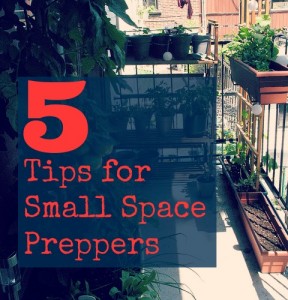 We can’t all live on a self-sufficient ranch in the foothills of Montana. And truth be told, most of us really don’t want to… despite our romanticized impressions of living in out “in nature.”
We can’t all live on a self-sufficient ranch in the foothills of Montana. And truth be told, most of us really don’t want to… despite our romanticized impressions of living in out “in nature.”
There’s an awful lot to be said for living within a reasonable driving distance of a doctor’s office, grocery store, movie theater, etc. The truth is, not everyone is cut out for living in isolation, no matter how beautiful the views are.
And that’s OKAY.
Don’t think you can’t practice self-reliance because you live in a small apartment or condo or even a zero-lot line home in the suburbs. There are advantages and disadvantages to every location.
Likewise, there are many ways to innovate your preparedness plans to suit your space, no matter how big or small. Here are 5 tips for making the most out of your space.
1. Max Out Your Water Resources – One of the most important resources in a crisis is clean water. If you live in an apartment, chances are that you won’t have access to a clean mountain stream, pond, or even a large storage tank. That doesn’t mean you can’t store at least 30 days of fresh drinking water.
Several options are available, one of which is to simply keep a 55-gallon barrel of drinking water on your patio. An emergency bathtub water bladder is a more flexible alternative. It’s also critical to know of a few
2. Become a 4-ft Farmer – You may be shocked by how much you can grow in a space the size of a file cabinet. It may not allow you to be completely self-sufficient, but you can supplement your food stockpile with fresh fruit, veggies, and even fish with my Endless Food Source. Then again, you can always scale up your system and get completely off the food grid.
3. Practice Maximum OPSEC – Privacy can be a scare commodity in many condos and apartments. In some situations, management and maintenance workers actually have keys to your unit.
Compounding the “Operational Security” problem is that many of your preps may seem especially unusual to your apartment-dwelling neighbors. It’s a bit of a demographics issue. In a rural area, no one would bat an eye when you pull up with a huge water tank in the back of your truck, or a crate of rabbits, or 400lbs of fertilizer… The same is not true of an apartment high-rise.
That’s why privacy is key. All food storage should be concealed as best as possible. Any weapons should be stored well out of sight, unloaded, or locked away in a safe. Privacy will help you protect your survival gear in an emergency. No one can steal your food, silver coins, water, or weapons if they don’t know these supplies exist.
4. Store Your Food Wisely – Many of the places I’ve recommended in my “15 Places to Store Food” may not be available to you if you live in an apartment — especially if you don’t have the room to spare. That’s okay. In fact, it can even be an advantage.

You see, one of the biggest food storage mistakes I see on a regular basis is keeping all food in one place. Especially a basement or garage where it can easily be damaged by heat or flooding.
Spreading your stockpile throughout several locations, such as your car, office, or even a storage unit, can solve your space problems while also giving you more ways to access critical supplies in the event that you can’t return home during a crisis.
5. Turn Your Balcony into a Ranch – Believe it or not, small space “livestock” is no joke. In fact, my Endless Food Supply includes one type of animal (hint: it has gills) you can raise, no matter how much space you have.
A small side yard is all you need to raise talapia, catfish or even rabbits. Depending on where you live, chickens may be an option. Then you have eggs, a building block of self-sufficiency.

